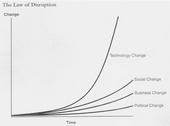THE SINGULARITY=BEYOND EPIC
What, then, is the Singularity? It's a future period during which the pace of technological change will be so rapid, its impact so deep, that human life will be irreversibly transformed. Although neither utopian or dystopian, this epoch will transform the concepts that we rely on to give meaning to our lives, from our business models to the cycle of human life, including death itself. Understanding the Singularity will alter our perspective on the significance of our past and the ramifications for our future. To truly understand it inherently changes one's view of life in general and one's own particular life. I regard someone who understands the Singularity and who has reflected on its implications for his or her own life as a 'singularitarian.' - Ray Kurzweil
The really interesting part about the creation of smarter-than-human intelligence is the positive-feedback effect. Technology is the product of intelligence, so when intelligence is enhanced by technology, you've got transhumans who are more effective at creating better transhumans, who are more effective at creating even better transhumans. Cro-Magnons changed faster than Neanderthals, agricultural society changed faster than hunter-gatherer society, printing-press society changed faster than clay-tablet society, and now we have "Internet time". And yet all the difference between an Internet CEO and a hunter-gatherer is a matter of knowledge and culture, of "software". Our "hardware", our minds, emotions, our fundamental level of intelligence, are unchanged from fifty thousand years ago. Within a couple of decades, for the first time in human history, we will have the ability to modify the hardware. And it won't stop there. The first-stage enhanced humans or artificial minds might only be around for months or even days before creating the next step. Then it happens again. Then again. Whatever the ultimate ends of existence, we might live to see them. - Eliezer Yudkowsky
"In everyday life, we underrate the importance of intelligence because our social environment consists of only other humans, who as a species are far more intelligent than mice or lizards. The rise of human general intelligence enormously transformed the world. Yet we may have only begun to see the effects of intelligence. In 1965, the Bayesian statistician I. J. Good published a paper titled "Speculations Concerning the First Ultraintelligent Machine", in which he suggested that a sufficiently intelligent AI could redesign itself to make itself smarter, and then, being smarter, re-reinvent itself and become smarter still - a positive feedback cycle. Good labeled this the "intelligence explosion". An intelligence explosion could reshape the universe more than all human actions up to this point. It is the responsibility of this generation to shape the intelligence explosion."- Eliezer Yudkowsky
"If you took a poll of primitive man, happiness would be getting a fire to light more easily, but we've expanded our horizon, and that kind of happiness is now the wrong thing to focus on. Extending our knowledge and casting a wider net of consciousness is the purpose of life." – Ray Kurzweil
"We are not human beings having a spiritual experience. We are spiritual beings having a human experience." -Teilhard de Chardin
Links:
KurzweilAI.net
Singularity.com
Kevin Kelly's "The Technium"
On Singularity
The Law of Accelerating Returns.(Highly recommended)
The Singularity Institute for Artificial Intelligence.
www.overcomingbias.com
betterhumans.com
Peter Russell's Website: The Spirit of Now
The Institute for Ethics and Emerging Technologies
IEEE Spectrum: Special Report: The Singularity
ASF Future Salon Network
Nick Bostrom's home page
Future of Humanity Institute at Oxford
Future Shock Levels, by Eliezer Yudkowsky
Videos:
NEW:
(Spacecollective.org)We Are The Web:
(Spacecollective.org)Runaway Infrastructure:
(Spacecollective.org)Future of the Species:
Bill Clinton on Nonzero
Robert Wright on Nonzero and a direction of history:
Kevin Kelly on predicting the next 5,000 days of the internet:
The Singularity Institute for Artificial Intelligence
Ray Kurzweil and Charlie Rose
Aubrey de Grey: Why we age and how we can avoid it
Kevin Kelly: How does technology evolve?
Dr. Michio Kaku: Visions of the Future
TED: Craig Venter on the verge of Artificial Life
